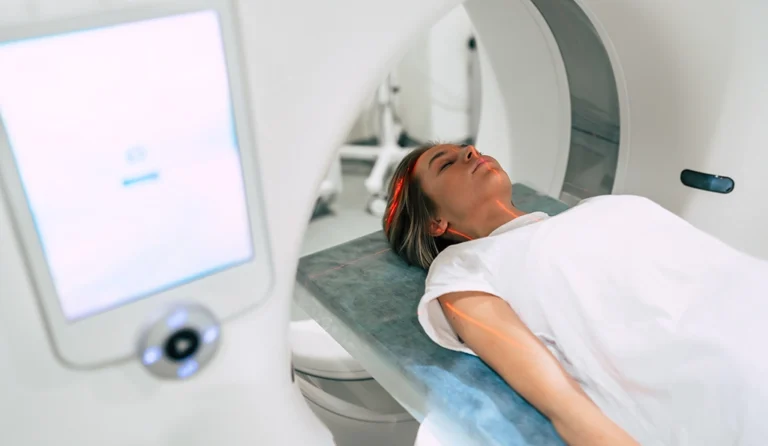Digestive health plays an important role in overall well-being, yet millions of people experience chronic gastrointestinal issues without clear answers. Conditions like irritable bowel syndrome (IBS) can cause persistent discomfort, affecting daily life and making it difficult to enjoy normal activities. Since IBS shares symptoms with several other digestive conditions, diagnosing it can be challenging and requires your doctor to assess every part of your gut health.
Your “gut” refers to your stomach, throat, esophagus, small intestine, large intestine, liver, pancreas, and gallbladder. Your gastrointestinal tract contains certain bacteria that help process food and eliminate waste. When these bacteria levels change, gut health changes––for better or worse. Your gut health can impact your overall health, including your mental health, immune system health, and cardiac health.
Poor gut health can have many different causes. While imaging cannot diagnose IBS directly, it serves as an important tool in ruling out other conditions with similar symptoms, such as inflammatory bowel disease (IBD), infections, tumors, ulcers, and structural abnormalities.
Correcting gut health looks different for every person. It starts with diagnosing the problem, usually revealed by a series of blood tests, physical exams, and medical imaging studies. Advanced imaging techniques like CT abdomen and pelvis scans and virtual colonoscopies (CT colonography) may be recommended by your doctor to narrow in on a diagnosis or optimize a treatment plan. For some, a simple diet and lifestyle change can do the trick. For others, continued monitoring and medication might be needed.
The Link Between Gut Health and IBS Symptoms
The digestive system is home to trillions of bacteria that contribute to gut microbiome balance, digestion, and immune function. When this balance is disrupted, it can lead to symptoms such as bloating, abdominal pain, irregular bowel movements, and food sensitivities. IBS is one of the most common functional gastrointestinal disorders, meaning that symptoms arise from abnormal gut function rather than structural disease.
While the exact cause of IBS remains unclear, several factors may contribute to its development, including:
- Gut-brain interaction – The gut and brain communicate through the nervous system, and stress or anxiety can trigger IBS symptoms.
- Microbiome imbalance – Changes in gut bacteria composition may contribute to bloating, gas, and sensitivity to certain foods.
- Food intolerances – Certain carbohydrates (FODMAPs) and other dietary triggers can worsen IBS symptoms.
- Post-infectious IBS – Some cases of IBS develop after a severe gastrointestinal infection, indicating a possible link between gut inflammation and long-term symptoms.
Since IBS does not cause structural damage to the digestive tract, it cannot be detected through medical imaging techniques. However, imaging studies are crucial in excluding other conditions that can cause similar symptoms, such as Crohn’s disease, ulcerative colitis, diverticulitis, and colon cancer.
How Imaging Helps Diagnose IBS and Gut Disorders
When a patient presents with persistent abdominal pain, bloating, diarrhea, constipation, or changes in bowel habits, doctors may recommend imaging to ensure there are no underlying structural issues contributing to these symptoms.
CT scans provide detailed cross-sectional images of the digestive organs, including the stomach, intestines’, liver, pancreas, and gallbladder. This imaging techniques helps identify conditions that mimic IBS, such as:
- Inflammatory Bowel Disease (IBD) – Conditions like Crohn’s disease and ulcerative colitis cause chronic inflammation that can be visualized on CT scans.
- Diverticulitis – Infections in small pouches along the intestinal walls can cause pain and digestive issues.
- Kidney Stones and Gallstones – These can cause abdominal pain similar to IBS and may be detected through a CT scan.
- Tumors or Polyps – Abnormal growths in the intestines or surrounding organs can be identified through CT imaging.
A virtual colonoscopy, also known as CT colonography, is a non-invasive alternative to a traditional colonoscopy. This advanced imaging study uses CT technology to create detailed 3D images of the colon and rectum, allowing doctors to check for:
- Colon polyps that may require further examination or removal.
- Diverticulosis, a condition where small pouches form in the colon lining.
- Abnormalities that could indicate colorectal cancer.
The Future of Imaging in IBS Research
New research suggests that CT colonography may provide additional insights into IBS. A study published in the World Journal of Gastroenterology found that patients with IBS may have subtle differences in colon length and diameters, which could contribute to symptoms.
While these findings are still being explored, they suggest that imaging could eventually play a greater role in the understanding of the underlying triggers of IBS.
When Should You Consider Imaging for Gut Health?
If you are experiencing persistent abdominal discomfort, bloating, diarrhea, constipation, or unexplained changes in digestion, talk to your doctor about whether imaging could be beneficial. CT scans and virtual colonoscopy can help rule out other conditions that may require different treatments, ensuring that you receive the most appropriate care for your symptoms.
While imaging may not directly diagnose IBS, it is an essential part of the diagnostic process, giving you and your doctor greater confidence in your treatment plan.
How Do I Prepare For An Abdominal Imaging Study?
Proper preparation is key to ensuring clear and accurate imaging results. For a CT abdomen and pelvis scan, your doctor may ask you to refrain from eating or drinking for several hours beforehand, particularly if contrast dye is required.
If contrast is needed, you may be asked to drink a special oral contrast solution or receive an intravenous (IV) injection to enhance the clarity of the images. It is important to inform your provider of any allergies, kidney conditions, or pregnancy, as these factors could affect the use of contrast dye.
On the day of the scan, wearing comfortable clothing and avoiding metal accessories will help ensure a smooth imaging process.
For a virtual colonoscopy (CT colonography), preparation is similar to that of a traditional colonoscopy and involves cleansing the bowel beforehand. Your doctor will provide specific instructions, which typically include following a liquid diet and taking prescribed laxatives the day before the procedure to ensure the colon is empty.
A contrast agent may be used to improve image clarity, so it is important to notify your doctor of any allergies in advance.
During the study, air or carbon dioxide is gently introduced into the colon to provide a clearer view, which may cause temporary bloating or mild cramping. Unlike traditional colonoscopies, virtual colonoscopy does not require sedation, allowing you to resume normal activities shortly after the exam.
Proper preparation is essential to achieving the most accurate results, enabling doctors to make a confident diagnosis and rule out other potential causes of digestive discomfort.
How to schedule an appointment with us
Your gut health plays a big part in supporting your overall well-being, and persistent digestive symptoms should never be ignored, If you’re experiencing ongoing discomfort, South Jersey Radiology offers advanced imaging services, including CT scans and virtual colonoscopies, to help provide the answers you need.
Our team of board-certified, subspecialized radiologists undergo specific training in different areas of the body and will deliver your results to help diagnose the condition you experiencing.
It is easy to schedule an appointment – simply visit our online self-scheduler or reach out to one of our following locations below:
- Cherry Hill Office – Cherry Hill, NJ
- Haddonfield Office – Haddonfield, NJ
- Marlton (Greentree) Office – Marlton, NJ
- Medford Office – Medford, NJ
- Moorestown Office – Moorestown, NJ
- Mount Laurel Office – Mount Laurel, NJ
- Turnersville Office – Turnersville, NJ
- Route 73 (Voorhees) Office – Voorhees Township, NJ
- Voorhees (Carnie Blvd) Office – Voorhees Township, NJ
- Sewell (Washington Twp) Office – Sewell, NJ
- West Deptford Office – West Deptford, NJ
- Willingboro Office – Willingboro, NJ
Learn more about the board-certified, subspecialized radiologists who read and interpret studies at SJRA here.
Frequently Asked Questions
IBS is a functional gastrointestinal disorder characterized by symptoms such as abdominal pain, bloating, and changes in bowel habits, including diarrhea and constipation. Unlike some other digestive conditions, IBS does not cause visible damage to the digestive tract.
No, imaging studies cannot directly diagnose IBS, as it does not cause structural changes detectable by imaging. However, imaging is essential to rule out other conditions with similar symptoms, such as inflammatory bowel disease, infections, or tumors.
A CT (Computed Tomography) abdomen and pelvis scan uses X-rays to create detailed cross-sectional images of the abdominal organs. This imaging helps identify conditions that may mimic IBS symptoms, such as diverticulitis, kidney stones, or tumors.
A virtual colonoscopy, or CT colonography, is a non-invasive imaging test that uses CT scanning to produce 3D images of the colon and rectum. It’s used to detect polyps, diverticulosis, or abnormalities that could indicate colorectal cancer. While it doesn’t diagnose IBS, it helps exclude other serious conditions presenting with similar symptoms.
Preparation may involve fasting for several hours before the scan, especially if contrast dye will be used. You should inform your provider about any allergies, kidney issues, or if you’re pregnant, as these factors could affect the use of contrast dye. Wearing comfortable clothing and removing metal objects can also facilitate the process.
Preparation includes cleansing the bowel, typically involving a liquid diet and prescribed laxatives the day before the procedure. A contrast agent may be used to enhance image clarity, so notify your doctor of any allergies. During the procedure, air or carbon dioxide is introduced into the colon to provide a clearer view, which may cause temporary bloating or mild cramping.




